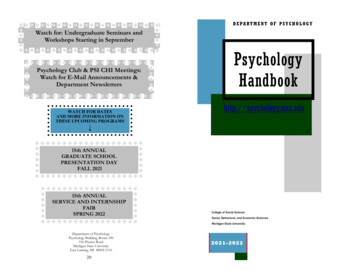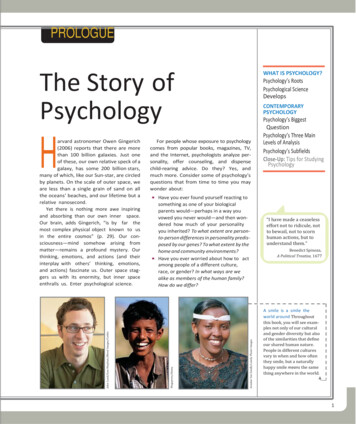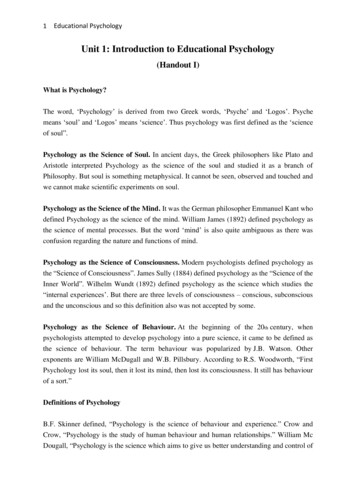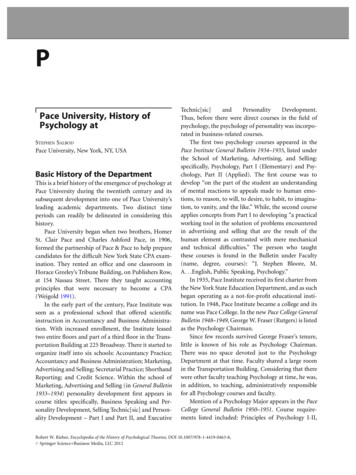
Transcription
DEPARTMENT OF PSYCHO LOGYWatch for: Undergraduate Seminars andWorkshops Starting in SeptemberPsychology Club & PSI CHI Meetings:Watch for E-Mail Announcements &Department NewslettersWATCH FOR DATESAND MORE INFORMATION ONTHESE UPCOMING u 15th ANNUALGRADUATE SCHOOLPRESENTATION DAYFALL 202115th ANNUALSERVICE AND INTERNSHIPFAIRSPRING 2022College of Social ScienceSocial, Behavioral, and Economic SciencesMichigan State UniversityDepartment of PsychologyPsychology Building, Room 100316 Physics RoadMichigan State UniversityEast Lansing, MI 48824-111620
WEB RESOURCESPROGRAM REQUIREMENTS AND SCHEDULINGPlease note that you bear ultimate responsibility for knowing and fulfillinggraduation requirements. It is therefore essential that you use all of theUniversity publications available to you. These include the: Academic Programs: reg.msu.edu/AcademicPrograms for rules andprocedures. Description of Courses: reg.msu.edu/Courses/search.asp for courseinformation and prerequisites. Schedule of Courses: http://schedule.msu.edu to plan schedules and lookup section numbers, and schedule classes.CAREER INFORMATION: MSU Handshake: https://msu.joinhandshake.com/login UtilizeHandshake to make appointments with career advisors and career peers aswell as search for job and internship positions.O*NET Resource Center: http://onetcenter.org/ for descriptions ofcareers—nature of the work, salary information, and much more.Dictionary of Occupational Titles (DOT): occupationalinfo.org/ fordescriptions of numerous occupations.United Way Volunteer Opportunities anywhere in the USA: https://www.unitedway.org/get-involved/volunteer# You can locate volunteeropportunities in your hometown or nearby that you could possibly do overthe summer.Career Services Network: http://careernetwork.msu.edu/ for MSUcareer information and services.College of Social Science Career verview/career-services/.PSYCHOLOGY INFORMATION 2MSU Psychology Website: psychology.msu.eduAmerican Psychological Association: apa.orgPsychopathology Information: psychopathology.orgIndustrial/Organizational Psychology: siop.org, aomonline.org/,shrm.orgCommunity Psychology: scra27.orgCognitive Psychology: al science.org, http://www.psychonomic.org/Behavioral Neuroscience: isdp.orgSocial Psychology: socialpsychology.org, sesp.org19
STUDENT RESOURCESCAREER SERVICES NETWORK113 Student Services URCE CENTER FORPERSONS WITH DISABILITIES120 Bessey Hallhttp://rcpd.msu.edu517-884-7273CENTER FOR COMMUNITYENGAGED LEARNING345 Student Services UDENT ADVISING & AFFAIRSNeighborhood Engagement Ctr.https://nssc.msu.edu/ Brody Neighborhood160 Brody Hall, 517-884-6670 East NeighborhoodC130 Hubbard Hall, 517-884-3501 North/Union Neighborhood200 Union Building, 517-884-4050 River Trail/McDonel NeighborhoodC101 McDonel Hall, 517-884-4080 South NeighborhoodHolden Hall, 517-884-6680COUNSELING & PSYCHIATRICSERVICES3rd Floor, Olin Health Centerhttp://caps.msu.edu517-355-8270OFFICE OF FINANCIAL AID252 Student Services Bldg.http://finaid.msu.edu/517-353-5940OFFICE OF THE REGISTRAR150 Administration Bldg.http://reg.msu.edu/517-355-3300DEPARTMENT OF STUDENTLIFE101 Student Services Bldg.http://studentlife.msu.edu/517-355-8286OFFICE OF SUPPORTIVESERVICES209 Bessey Hallhttp://oss.msu.edu517-353-5210TESTING OFFICE207 Student Services Bldg.http://testingoffice.msu.edu/517-355-8385THE WRITING CENTER300 Bessey Hallhttp://writing.msu.edu517-432-3610OFFICE OF THEOMBUDSPERSON129 N. Kedzie Hallhttp://msu.edu/unit/ombud/517-353-8830WELCOME TO PSYCHOLOGY!Welcome to the Department of Psychology at Michigan StateUniversity! Psychology is one of the largest majors on campusand has many exciting opportunities that are available to you.From our number of courses, to our experiential-learning activities, you should leave MSU with a very comprehensive degree!This handbook is intended for students who have declared Psychology as their major during the 2021–2022 academic year.As a new student majoring in Psychology, you will need to understand and learn the requirements for your degree as well asthe resources available to you on our campus. We hope that thishandbook will help you navigate these requirements and available resources.In addition to this handbook, you should utilize the Psychologyand University websites. The Psychology Department website,http://psychology.msu.edu/, contains valuable information thatwill help you select PSY courses, careers, areas of interest toinvestigate, graduate schools, workshops, and fulfill degree requirements. The University website, http://msu.edu/, will offeryou calendars, MSU News, course descriptions, people search,SIS and much more.The official guide for degree requirements can be found in theAcademic Programs Catalog or at http://reg.msu.edu/AcademicPrograms/.We are here to help you in any way! We hope to see you atleast once a semester. Don’t miss out on advice and guidancefor course selection and your career!PRE-HEALTH UDENTS/PREHEALTH/108 Natural Science Bldg.517-355-8419Undergraduate Psychology Advising OfficeMichigan State UniversityPsychology Building, Room 100316 Physics Rd.East Lansing, Michigan 48824-1116517-353-0753183
ADVISINGAdvising in the Psychology Department is done in many different formats.We offer appointment (in-person and via Zoom), drop-in advising (in-personand via Zoom), and various forms of group advising. Our appointments arescheduled on-line at https://student.msu.edu/Drop-ins are available Monday – Friday from 1:00pm – 3:00pm during theacademic year. In-person advising takes place in the UndergraduatePsychology Advising Office in Room 100 Psychology Building. Groupadvising takes place through seminars, workshops, and other events that youwill have the option to participate in throughout the year. Notification ofthese events will be done through newsletters, emails, and on the online newsand events page of the Psychology Department Undergraduate website.*More information about the Student Information System and help schedulingan appointment, please visit SIS Help Student Information System Michigan State University (msu.edu)Please see a Psychology advisor to discuss or review: BA or BS in Psychology, Additional Majors, Second Degrees, or MinorsAdding, dropping, or changing a major or degreePlanning course schedulesOpportunities: independent studies, internships, practicums,volunteering, employment, awards, scholarships, study abroad, andmore Progress in meeting requirements and potential graduation dateGraduate or professional school planningOther academic and/or career needsAdvisors: Sarah Handspike, Director of Advising andUndergraduate Services: meadsara@msu.eduLindsay Spitzley, Assistant Director of Advising and UndergraduateServices: spitzlin@msu.eduRachael Zaborowski, Academic Advisor and Coordinator of First YearExperience: zaborach@msu.eduSydney Padgett, Graduate Assistant: psyugrad@msu.eduOffice Staff: GRADUATE SCHOOLIf you have been a high-achieving, conscientious student and are motivated todedicate yourself to a much higher level of scholarly reading, writing, and researchin a specific field, you may be a good candidate for graduate school. You must beable to demonstrate your commitment to academic success by what you haveachieved in your undergraduate program. Graduate school is not something youjust fall into because you haven’t chosen what to do next with your life or becauseyou are worried about employment opportunities or salary. A graduate degreedoes not guarantee you a job or a high salary.Graduate study in psychology consists of advanced training in a specific area. Itshould be viewed as professional training for a career, not just an extension ofundergraduate courses. Consider very carefully why you want to go to graduateschool and what your expectations are. You will also need to know which area ofpsychology you want to pursue.Competition for admission is intense. Only the most qualified students areadmitted. About 38 percent of psychology majors go on to some form ofgraduate study (MSU Destination Survey, 2016) er-planning. For a good program, meeting the minimumstandards for admission is not usually sufficient; you must do more. For example,the minimum GPA for entering most Ph.D. programs is a 3.2, but students whoare actually admitted have a much higher GPA (generally a 3.5 or higher). Someprograms place more emphasis on the GPA earned during the junior and senioryears. Your undergraduate GPA and coursework, Graduate Record Exam scoreshttp://www.ets.org/gre, letters of reference, research and clinical experiences,and personal statement must show that you will be a successful graduate student.Due to the breadth and diversity of courses in the psychology degree, studentscan apply to graduate school within the field of psychology or choose to apply toother related programs. Programs that are very popular that are not within ourpsychology department are: School Psychology, Social Work, Human Resourcesand Labor Relations, Counseling, Sport Psychology, Student Affairs, Public Policyand Public Health. Many Psychology majors also choose to go on to professionalprograms like law and medical school.Additional information on many of these graduate programs can be found in theUndergraduate Psychology Advising Center, Room 100 Psychology Building, andon our website. Check out our Career Connection flyers in the office to learnmore about what is needed for these programs. There are also graduate schoolbooks that can be checked out of our lending library.Meeting with advisors and faculty is imperative for finding out how to apply tograduate school and to decide whether or not it is a good option for your careerplans. Understanding how to get there and what it entails takes time and a lot ofplanning. Don’t wait until it is too late!Audra Jeffrey: jeffre22@msu.eduKim Brown: brown826@msu.edu417
CAREER OPTIONS FOR PSYCHOLOGY GRADUATESGraduates of our department can compete effectively with other students who have obtained a general/liberal arts education, as well as those who have opted for more specializedcurricula. Your performance as a psychology major and your willingness to prepare for avariety of career options will influence your attractiveness to employers and eventual careerplacement. Preparing for the job market and then building your career takes planning andeffort over a long period of time. You should take steps each semester, beginning with yourfreshman year, toward this end. Strive to incorporate the following into your undergraduateexperience from a combination of course selections and other activities: Oral & WrittenCommunication Skills, Teamwork, Critical Thinking, Problem Solving, Leadership,Research Methodology, Computer Literacy, and Work Experience. Find data regarding MSU PSY careers at the MSU Destination survey here: y%20(CSS)CAREER AREAS FOR PSYCHOLOGY GRADUATESPSYCHOLOGY OFFICE RESOURCESThere are reference materials, books that may be borrowed, handouts, freepublications, and postings managed by the Advising Office in Room 100Psychology Building that are available to you and provide information about: Career Options Graduate Programs Independent Study Opportunities Additional Majors/Minors PSI CHI National Honor Society Psychology Club Psychology Service and Intern Fair Psychology-Related Job Postings Scholarships Service-Learning Opportunities Education Abroad Information Volunteer Opportunities .and moreChild/Youth/Elder CareHuman ResourcesResidential ServicesCommunity ServicesHuman ServicesRetail ManagementConsulting ServicesManufacturing/ProductionRetail/Wholesale SalesCourt/Juvenile ServicesMarket ResearchSocial ServicesCustomer ServicesGovernment/Legislative Services Special Populations ServicesEmployee RelationsPersonnel/Human ResourcesStudent/Alumni ServicesE-MAILEmployment ServicesPrivate/Nonprofit ManagementSubstance Abuse ServicesFinancial ServicesPublic Relations/Media ServicesVolunteer ServicesDue to the nature and quantity of e-mails that we receive, we encourage youto meet with us face-to-face when you are looking for detailed information.We welcome e-mails that are simple in nature. For general questions, pleasee-mail the Psychology advisors at psyugrad@msu.edu.GET INVOLVEDSTUDENT GROUPSThe Psychology Club is open to all students interested in the field of psychology. Interestedstudents should come to the regularly scheduled meetings. Check out posted meeting datesat the Psychology Club website http://msupsyclub.weebly.com/. Contact Rachael Zaborowski at zaborach@msu.edu or psyclub@msu.edu.Membership in PSI CHI, the National Honor Society in Psychology, is by invitation.Check the showcase outside Room 100 Psychology Building for information. Contact Dr.Jonathan Weaver at weaver71@msu.edu or secretaryofpsichi@gmail.com or check outhttp://psichi.org/.VOLUNTEERINGThe Center for Community Engaged Learning provides volunteer opportunities in a varietyof contexts. Explore volunteer positions and apply online. Contact them at 517-353-4400,stop by Room 345 Student Services Building, or go to:http://servicelearning.msu.edu/.STUDENT LIFEGet involved on campus. Become a leader. Check out over 500 student organizations inRoom 101 Student Services Building, http://studentlife.msu.edu/.16HONORS COLLEGEMembers of the Honors College who have questions regarding coursescheduling, career planning and graduate school preparations can be seen inthe Undergraduate Advising Center, Room 100 Psychology Building.Honors students should also meet with the Psychology Honors Facultymember prior to their junior year to discuss the optional Honors Thesis.Psychology Honors information can be found on the PsychologyDepartment Undergraduate website.Psychology Department Honors Faculty: Dr. Susan Ravizza, ravizzas@msu.eduFor questions regarding admission to the Honors College as a freshman,please direct your questions to the Honors College at http://honorscollege.msu.edu/.5
FRAMEWORK FOR PSYCHOLOGY DEGREE REQUIREMENTSTo ensure that you receive an appropriately broad and well-balanced education atMSU, psychology majors must satisfy the requirements of three separate units thatrepresent three administrative levels: the University, the College of Social Science, andthe Department of Psychology. You must meet the graduation requirements of eachunit. In addition, you will need to choose elective coursework to achieve theminimum number of 120 credits for a degree. You must complete 30 of your totalcredits at the 300 or 400 level. An illustration of the degree framework is shownbelow.RESEARCH WITH FACULTYAnother opportunity for credit is independent study. Independent studies are important for students planning to apply for graduate school. This experience gives students great opportunities towork with faculty and graduate students in the research environment. Research credit can beearned through PSY 490/491 or it can be done as a volunteer.PSY 490 Special Problems in Psychology (Fall, Spring, Summer) Description: Students work under the direction of a faculty member on an experimental, theoretical, or applied problem. This is a graded course. Restrictions: As specified by the faculty member of record. A maximum of 1-8credits can be taken in a semester with a combined total of 12 credits for the degree. Needs instructor and department approval.PSYCHOLOGY DEGREE CREDIT DISTRIBUTIONPsychology Degree Credit DistributionPSY 491 Participation in Psychological Project (Fall, Spring, Summer) Description: Students participate in a psychological project under direction of afaculty member. This is a pass/no grade (P/N) course. Restrictions: As specified by the faculty member of record. A maximum of 1-8credits can be taken in a semester with a combined total of 12 credits for the degree. Needs instructor and department approval.University (34 credits)WRA, Integrative Studies, MathElectives (BA 34-40 - BS 19-25)HOW TO LOCATE PSYCHOLOGY RESEARCH OPPORTUNITIESPsychology (31 credits)College (18 BA-33 BS credits)Of the 120 credits required, 30 credits need to be at the 300 or 400 level.CComplete a minimum of 120 credits (123 if you take MTH 1825).Complete a minimum of 120 credits.The following is a brief summary of University requirements; however, theAcademic Programs catalog http://reg.msu.edu/AcademicPrograms/is the official source for University policy. Complete a minimum of 120 credits with a 2.0 or better cumulative MSU GPA. Achieve a 2.0 or better Psychology cumulative GPA at MSU. Complete a minimum of 30 credits at MSU with a minimum of 27 credits on the East Lansing campus after junior status.Earn a minimum of 20 credits while in the major.Courses used to satisfy specific degree requirements may not be taken for CR/NC .No more than 10 of a student’s last 30 credits may be transferred in. PRIORAPPROVAL IS REQUIRED.A maximum of 60 credits can be accepted from a community college. Note: Before taking a course at another institution, you should clearly understand theThere are opportunities in the Department of Psychology for students to get involved in researchin a faculty member’s lab, either as a volunteer or for credit (via PSY 490 or PSY 491). There are anumber of ways to identify these opportunities. View listings on the Psychology website:Listings are located here on the psychology website: d-research.html Contacting faculty to learn of additional independent study opportunities:You can identify which faculty members are doing research in an area of interest to you. Go to thePsychology undergraduate website http://psychology.msu.edu. Select research areas of interest toidentify faculty doing research in a given topic area. Click on each one to learn more about theirparticular research. For each one that provides a “vita” (extensive resume) link, open the link tolearn more about that faculty member’s background, research, and recently published articles.College Restrictions on Experiential LearningThe total of independent study, practicum, internship, and field experience credits may notexceed 20 credits combined. If you have questions, contact a Psychology Advisor. A maximum of 12 credits of independent study may be applied toward the degree. A maximum of 12 credits in internship, field experience, and practicum coursescombined may be applied toward the degree. PSY 371/372 and 381 do not countagainst this limit.MSU Policy on transferability of courses. For more detailed information, please go tohttp://transfer.msu.edu/ and consult with your academic advisor.615
EXPERIENTIAL LEARNING FOR CREDITAn internship or practicum provides an opportunity to explore career possibilities and todevelop communication and organizational skills. Many employers expect college graduatesto have practical, work-related experience. Learning about the world of work and makingcontacts in your chosen field are essential tools for landing your first job. Instructor permission is required for these courses. More information and applications can be found onthe Undergraduate website under Get Involved.MSU ADOLESCENT DIVERSION PROGRAM, PSY 371/372 (6 cr.)The MSU Adolescent Diversion Program (https://msuadolescentprograms.wordpress.com/ ) isa two-semester commitment in which the student is trained and then mentors an adolescentinvolved in the juvenile justice system. This opportunity is offered every semester and the semesters have to be consecutive.Contact Sean Hankins, Director, at 517-355-9519hankinss@msu.edu.PRESCHOOL TRAUMA AND LOSS PROJECT, PSY 371/371 (6 cr.)This course is a two-semester commitment. First semester—learn research, theories and intervention techniques. Second semester—co-lead a 16 session program to help preschoolers copewith trauma and loss. If interested, contact Dr. Bogat at bogat@msu.edu.PSYCHOLOGY HUMAN SERVICES INTERNSHIP, PSY 381/382 (6-15 cr.)This course is a two-semester commitment. PSY 381 is in the spring and is a training and theorycourse. In PSY 382, students apply theory to practice. This internship is offered online in thesummer. Internships are required to be in the human services field. This is a great opportunity tolearn theories of human behavior, examine social problems, and “engage in strengths-basedclient centered service delivery”. Application materials are available on the undergraduate website. Contact Lindsay Spitzley spitzlin@msu.edu.BUSINESS PSYCHOLOGY INTERNSHIP, PSY 382 (3-12 cr.)In this course, students complete an internship related to Industrial/Organizational Psychology.As a prerequisite for the internship, students are required to complete PSY 255 so they havebackground knowledge of the factors relevant to improving organizational performance. Additionally, students are required to attend orientation sessions prior to the internship which is completed in the summer. All academic assignments for the course are completed online. Applicationmaterials are available online at the Psychology Department website. Contact Lindsay Spitzleyspitzlin@msu.eduGENERAL PSYCHOLOGY INTERNSHIP, PSY 382 (3-12 cr.)This internship is for students who desire experience in an area related to the field of Psychology.This can be very broad because Psychology touches on many fields, but all areas need to beapproved in advance by the department to make sure that they follow in line with the goals ofthe program. Application materials are available online at the Psychology Department website.Contact Lindsay Spitzley spitzlin@msu.eduCOLLEGE OF SOCIAL SCIENCE INTERNSHIP, SSC 493 (3-12 cr.)Internships are offered through the College of Social Science in various areas of interest, depending on your career goals. Call 517-353-0780, located in 201 Berkey Hall, tial-learning/credit-your-internship/STUDY ABROADStudy abroad is another way to look at the world differently. This can benefit your career, yourdegree, and in many cases, you personally. When students study abroad they choose to stepoutside of what they “know” and expose themselves to new thoughts, ideas and cultures. Psychology students are encouraged to go on programs where they can take courses to meet a variety of degree requirements. For more information on programs, search the study abroad databaseat http://studyabroad.msu.edu/.14UNIVERSITY REQUIRMENTSWRITING REQUIREMENT—The Tier I writing requirement is fulfilled bysuccessful completion of WRA 101 or 195H. The Tier II portion of yourwriting requirement is fulfilled by the completion of a designated 300-400 levelcourse in your major. These course titles are followed by a “W”.MATHEMATICS REQUIREMENT—Complete one of the following:*1. Complete two of the following courses: Mathematics 101, 102 or 103*2. Complete both of the following:a. Mathematics 103 (MTH 103A and MTH 103B together equal MTH103) andb. One of the following courses: Mathematics 114, 124, 132, 152H, or201; or Statistics and Probability 200 or 201. Students who place into anycourse in 2.b via the Mathematics Placement Exam need only complete thecourse in 2.b in order to fulfill the University Mathematics requirement.3. Complete one of the following: Mathematics 116*The psychology major requires college algebra (MTH 103) or algebraplacement waiver.INTEGRATIVE STUDIES REQUIREMENT—The Integrative Studiesrequirement includes the completion of coursework in the Arts & Humanities,the Social Sciences, and the Biological and Physical Sciences.Integrative Studies in Arts and Humanities—8 creditsIAH 201-210IAH 211 Integrative Studies in Social Science—8 creditsISS 2XXISS 3XXIntegrative Studies in Biological and Physical Sciences—8 creditsISB 2XXISP 2XX2 Credits of ISB/ISP LabPsychology majors pursuing the B.S. Degree may choose to complete theUniversity Alternative Science Track (see page 9 for details).DIVERSITY REQUIREMENT—Must include at least two courses in National,International , and Diversity from the following combinations: N&I; N&D; orI&D. The letter will be found after the IAH/ISS course title.7
COLLEGE OF SOCIAL SCIENCEREQUIREMENTS FOR ALL STUDENTSEXPERIENTIAL LEARNING REQUIREMENTAll students within the College of Social Science must complete an experiential learningrequirement. The experiential learning requirement may be satisfied either within oroutside the requirements of the major. The requirement may be met by completing a 3or 4-credit experiential learning course, approved by the College of Social Science Committee on Curriculum and Academic Policy or its designee. A list of approved courses ismaintained by the College of Social Science on their website. Many students completethis requirement by successfully completing a study abroad, a study away, an internshipor by conducting research with a faculty member. Please consult the CSS website forspecific lists and details: tstudents/curriculum.htmlINTERDISCIPLINARY MINOR REQUIREMENTComplete a minimum of 15 credits in one Interdisciplinary Minor from a list of minorsapproved by the College of Social Science Committee on Curriculum and AcademicPolicy. Examples of Minors approved for this requirement include: African Studies;Asian Studies; Cognitive Science; The City: Environment, Design and Society; Law, Justice, and Public Policy; Leadership of Organizations; Human Behavior and Social Services; Youth and Society; Environment and Health; International Development. A list ofapproved minors is maintained by the College of Social Science on their website. Minorrequirements can have some duplication between major and minor, but not more thantwo courses. If you wish to add one of the College of Social Science minors, please meet with a psychology advisor. Please consult the CSS website for specific lists and details: t-students/curriculum.htmlSCIENCE, TECHNOLOGY, ENGINEERING, MATHEMATICS(STEM) REQUIREMENTS FOR PSYCHOLOGYBACHELOR OF SCIENCEPSYCHOLOGY UNDERGRADUATE NEWSAND SOCIAL MEDIAWEBSITEThe Psychology Undergraduate website should be your go to site for important detailsregarding your psychology degree, advising information, opportunities to get involved,campus resources, career planning, honors program, SONA research participation andcourse syllabi. We recommend bookmarking this page for easy access to helpful and important information. Take some time to explore the website to become familiar with theopportunities that you have as an undergraduate student in psychology. There are manyopportunities to get involved in research, internship programs and study abroad/studyaway. This page also has easy access to scheduling advising appointments, updated drop-inhours schedule and an archive of monthly newsletters.PSY Undergraduate Website: mlSOCIAL MEDIAThe Psychology Undergraduate office manages a Facebook and Twitter page to keepstudents updated on news and events in the department. Use the account details below tolike and follow us so that you never miss an opportunity! Facebook: MSU Psychology Undergraduate Advising OfficeTwitter: MSU PSY UGRAD @MSU PSYUGRADNEWSLETTERWe send out a PSY Newsletter to all PSY students twice a month, typically on the 1st and15th of each month. This is a great place for you to stay up to date with advising drop-inhours, experiential learning opportunities, events from our department and across campus.The newsletter comes to your MSU email address; make sure that the PSY advisors emailsare not going to your junk box! We try to be conscious of the number of emails that youreceive daily; the newsletter is our way of sending you important announcements andopportunities without overloading your inbox. Please read the newsletter to take full advantage of the opportunities available to you!Complete the following mathematics requirement, which will satisfy the university mathematics requirement or the department STEM requirement, but not both:A. One of the following courses or placement waiver:MTH103College AlgebraMTH103BCollege Algebra IIMTH116College Algebra and TrigonometryB. One of the following courses:LB118Calculus IMTH124Survey of Calculus IMTH132Calculus IMTH152HHonors Calculus I813
PSYCHOLOGY BA vs. PSYCHOLOGY BSStudents can choose to pursue a Bachelor of Arts (BA) or Bachelor of Science (BS) degree in Psychology. When choosing a degree, students should always start with whatthey are most interested in. If you have always been good at science and math, and youlike it, you will most likely complete the Bachelor of Science in Psychology. If you havealways been a successful writer, like the humanities, and enjoy learning about people andcultures, you will probably want to pursue the Bachelor of Arts. It seems easy, but manystudents fall somewhere in the middle.Many students ask which is better for jobs and graduate school. There is not one goodanswer for everyone. The answer depends on how well you would do in each of theareas. Some students think that the B.S. is the only way to graduate school, but if youcan only get low grades in those courses, you may significantly hurt your chances foradmission. If your future graduate program does not require or recommend those courses, you could have just lowered your GPA for no reason.Most graduate programs want a diversity of courses. They also want students to showthat they can do well in challenging courses. This can be done through either the B.A. orthe B.S. degree in Psychology. It is most important to do well in the most challengingcourses that you can
psychology department are: School Psychology, Social Work, Human Resources and Labor Relations, Counseling, Sport Psychology, Student Affairs, Public Policy and Public Health. Many Psychology majors also choose to go on to professional Additional informati










